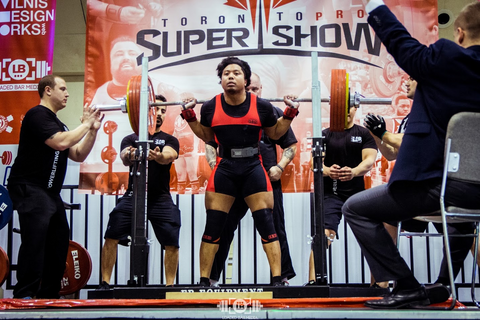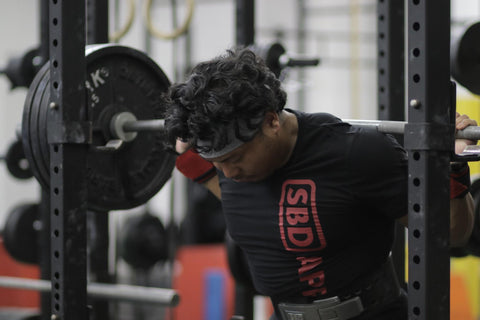Know Yourself: Insights from a Self-Coached Athlete
Introduction

Photo credit: Carlo Torres/Loaded Bar Media
“Who coaches you Walter?” People often are surprised when I say that I coach myself, and surprised even more when I tell them I’m not a strength coach or have a formal education in Kinesiology or Exercise Science. I am however, a former university student-athlete and have used the tools from that education and competitive experience to become a successful competitive powerlifter.
When people decide to hire a coach, it’s often because they often require knowledge and expertise or have trouble staying objective. They may need extra motivation and someone to hold them accountable in order to adhere to their training, or a combination of the above.
Expertise and Methodology
Study the sport. Learn the rules. Develop a solid foundation on scientifically supported/evidence-based strength training principles. The beauty of Powerlifting is there is so much free knowledge at your disposal. Granted it is hard to pick out what is useful and what is not, but there are forums, blogs and websites where renowned, proven athletes often post and provide their knowledge and insights. I have spent a lot of time reading articles, and watching videos. I have spent countless hours discussing training, programming, recovery and psychology with friends and colleagues from beginners all the way to elite level athletes and coaches. Some key concepts in the context to powerlifting discussed that still influence me to this day include: Daily Undulating Periodization (DUP), using overload (how much and when), managing physical and mental fatigue, conditioning and training around our busy schedules.
Whenever I was hurt or injured, I would do my due diligence and research as well as ask questions about the methodology behind my treatment. To me, knowledge is the easiest to improve upon. It is the application of that knowledge that is the hard part. If you are coaching yourself, it will require an extreme level of patience and willingness to make mistakes and learn from them. Sometimes it just boils down to experience with trial and error as you learn how your body specifically responds to training.
My gamechanger for self-coaching has to be the implementation of the RPE Autoregulation methodology developed by Mike Tuchscherer of Reactive Training Systems. I listened to the podcasts, read his articles and scoured the RTS YouTube channel and forums. It allowed me to attach objective measures to subjective feelings of fatigue and exertion with respect to bar load and number of reps. I studied it in depth, combined it with the stuff I learned over the years and developed something to call my own.This system works really well for me because I have learned how to listen to my body and train with discipline before stumbling upon it; knowing when to step on the gas and when to throttle down. Learning to autoregulate my training and being able to remain objective was a skill that took practice. This gave me a roadmap for how to do it more systematically rather than relying purely on intuition or strict and absolute numbers. It allowed me to control and optimize my training stimulus, which has my level of physical readiness vary daily due to my schedule rotating through days, evenings and nights with shift work at two hospital jobs. However, no system is perfect. It requires a great deal of introspection and personal honesty and even then that may not be enough. RPE training is not for everyone. Some may find percentage-based training with either +/- x of their target intensity. It adds another layer of objectivity when picking the right weight with which to load the bar.This brings me to my next key: Objectivity.
Objectivity
The ability to make the decisions to optimize one’s training objectively is quite elusive. Almost every decision you make has some sort of bias. The over-confident athlete may overestimate their strength in training and continuously pile the intensity and/or volume onto sloppy, grinding lifts and then fall apart on meet day. Conversely, those who underestimate themselves may find that they aren’t getting the optimal training effect because they are chronically not using enough intensity and/or volume. The RPE system is a great tool but it is not without its limits; There can be a great room for user error as you misjudge your RPE and as see in the preceding example, one can help reduce this problem is by filming your lifts. The camera doesn’t lie. You may lie to yourself, your friends might lie to you, but the camera does not. If you are unsure, a second opinion from someone you trust to be honest with you is a good or use an app or a device that can track bar speed.
Filming my lifts allows me to analyze my technique and bar speed and allow me to get a second opinion if needed by another experienced lifter I trust. Again, being able to properly diagnose issues with technique, bar loading and regulation requires knowledge and expertise. A great way to hone this skill is to watch others. Once you get a handle on what to look for theoretically, watching other people lift (with their permission, of course) will help you understand lifting mechanics. Furthermore, watching the technique of elite lifters built similarly (e.g. leverages/limb lengths) will help you with your own. Watching and thinking objectively about other people’s lifts develops your own eyes and thought processes.
The final tool for maintaining objectivity is tracking your training metrics. Log-books, spreadsheets, apps to track exercises, frequency, volume, tonnage, rest-times, calories and macros, and sleep. All these objective training variables are quantifiable and having the knowledge and expertise to manipulate them in order to produce results. Like the camera, the data doesn’t lie. I personally like using spreadsheets to track and analyze my training data with great success.

Data collection and interpretation can be a daunting task...
Motivation and Accountability
These two concepts in my opinion, are inextricably linked. When running low on your own self-motivation to train, a seasoned coach can help keep you motivated through programming and through conversation such as giving motivational guidance and finding sources of positive and negative reinforcement in your training as necessary. A great coach learns alongside their athletes and develops trust and chemistry. As an athlete, when you are running low on motivation, you find that extra ounce of willpower because you trust your coach and their process and you know that they are working just as hard and have invested just as much time and effort into your training as you have.
Having said that, I love coaching myself because I like being accountable only to myself. I have fallen in love with the process of getting stronger and becoming a better powerlifter. I enjoy problem-solving and critical thinking, which carries over into programming and training. I enjoy seeking out new methods and new perspectives on training to minimize stagnation and replicate success. Because I coach myself I know success and failure is my sole responsibility if it falls within my ability to control. I control what and when I eat, how much sleep I get, whether or not I am being diligent with my mobility, recovery and rehab. This goes back to my previous keys: knowledge, expertise and objectivity. I am experienced, learned and can be objective enough to hold myself accountable and when I reach my limits, I know when and where to seek help.

Photo credit: John Balatbat
Final Thoughts
Despite all having all the necessary tools to self-coach, people still opt to hire a coach, which I’ve alluded to previously. Part of being a good athlete is knowing where your limits are and prioritizing your energy. Well thought-out, carefully constructed programming is time intensive and managing your fatigue and numbers can be quite stressful. Even the best of the best - world class athletes who coach others for a living hire a coach to manage their training. Having the self-awareness to know when to ask for help; to know what you know and know what you don’t know is what I think the x-factor. During IPF Classic World’s in 2016, I had trouble making weight. A problem which I had never face previously as I had always made weight the night before competing. I had to initiate an emergency cut. I can say that was one of my worst competitions to date, especially after having such a productive training cycle leading up to World’s where coming off three back-to-back best meets of my life. Thankfully, Team Canada Coach Ryan Stinn was there to save the day and now I have more tools in my toolbox on meet day. I needed more efficient way to track my training in spreadsheets requiring more than just my rudimentary knowledge, so I worked with Teresa Yeung to develop a beautifully constructed training tracker while coaching her prep for 2016 Ontario Provincials. We’ve learned so much from each other and coaching her has made me a better lifter. She has grown to be who I think is Afterburn Barbell’s best meet day handler and there is no one else I'd trust more in my corner on meet day. If one were to label me Afterburn Barbell’s father, she would undoubtedly be its mother.

Long-time friends, Antwane and Silvia - competitive bodybuilders and coaches reached out and offered to help me with my assistance training and diet for Nationals. Initially I was skeptical but eventually came around and learned a great deal from them. I had been coaching myself within the Powerlifting box of high-specificity for so long that I neglected the bigger picture. I picked up some new tricks and they helped me correct some of my movement patterns. Silvia kept me on track and accountable to my diet and Antwane refused to let me neglect the assistance. And it paid off...
I owe a great deal of my success as a self-coached Powerlifter to the environment in which I train - Afterburn Barbell and the greater extended family of Afterburn Fitness and before that the UofT Scarborough gym and the UofT AC. For more on that story, stay tuned for a future blog: The Rise of Afterburn Barbell.






